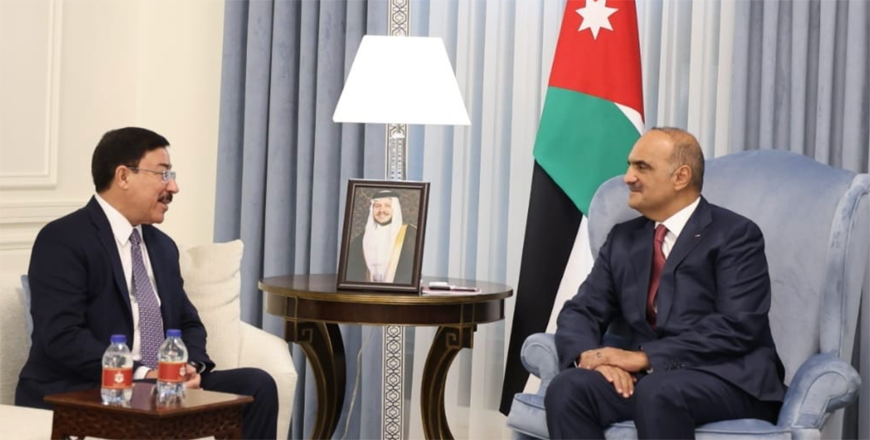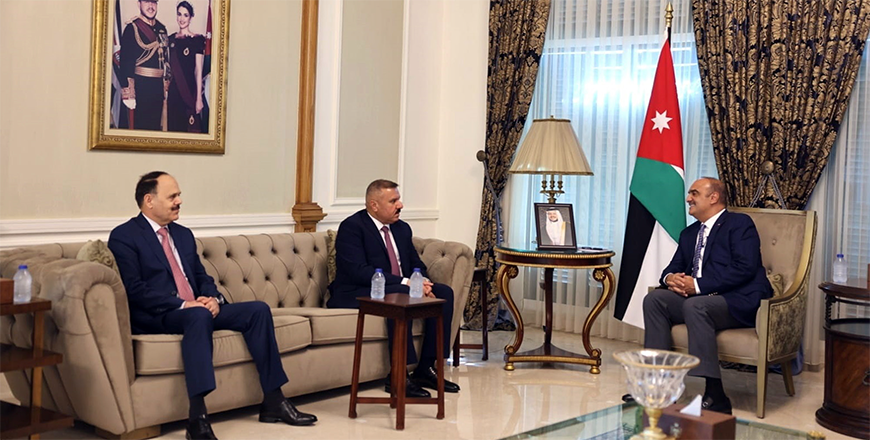You are here
PM, Iraq counterpart discuss strategic ties in Baghdad meeting
By JT - Jul 25,2023 - Last updated at Jul 25,2023

Prime Minister Bisher Khasawneh meets with Iraqi Prime Minister Mohammed Shia Al Sudani in Baghdad on Monday (Petra photo)
AMMAN — Prime Minister Bisher Khasawneh and Iraqi Prime Minister Mohammed Shia Al Sudani on Monday held talks in Baghdad over means to strengthen strategic cooperation between Jordan and Iraq.
Khasawneh conveyed the greetings of His Majesty King Abdullah and HRH Crown Prince Hussein to the Iraqi prime minister and the Iraqi government, the Jordan News Agency, Petra, reported.
In a joint statement with his Iraqi counterpart, Khasawneh noted that the meeting served as an opportunity to discuss common political stances, highlighting the importance of the “deep-rooted and strategic” relations between the two countries.
He also noted that both parties addressed the continuation of security coordination to combat terrorism and extremism, adding that any “loopholes through which terrorism might infiltrate” must be blocked.
The premier stressed Jordan's determination to find a political ground for resolving the Palestinian issue based on the two-state solution, establishing an independent, fully sovereign, and viable Palestinian state on the pre-1967 lines with East Jerusalem as its capital.
Jordan will continue protecting Islamic and Christian holy sites in occupied Jerusalem under the Hashemite Custodianship, he added.
Khasawneh noted that various integration mechanisms, including within the investment sector, were featured during the conversation, as well as ways of sharing Jordan’s “promising” renewable energy expertise with Iraq.
The prime minister stressed the importance of the trilateral mechanism that brings together Jordan, Iraq, and Egypt through various projects. He also referred to the trilateral mechanism’s electrical connectivity project, the first phase of which is expected to conclude in August, and the economic estate project on the border between Jordan and Iraq.
Khasawneh said that the talks included an agreement to increase oil imports Iraq from 10,000 to 15,000 barrels per day, which partially contributes to Jordan’s 134,000 barrels daily requirement.
He also pointed to the agreement to establish the Jordanian-Iraqi joint business council, noting the need to ensure that the agreement’s activation boosts strategic relations.
The prime minister also noted that his Iraqi counterpart expressed a willingness to consider Jordan’s request to utilise Iraqi mining and oil exploration expertise.
Khasawneh reiterated Jordan’s rejection and condemnation of the instances of burning copies of the Holy Koran, stressing that such practices are far from freedom of expression and can fuel religious hatred.
For his part, Sudani expressed gratitude and appreciation to King Abdullah for his unwavering support for Iraq and its people.
The Iraq prime minister stressed the depth of the historical relations between the two countries, and the “sincere and serious desire” to enhance cooperation frameworks, pointing out that these endeavours are politically and popularly accepted in both countries.
He noted that the meetings held during Khasawneh’s visit to Baghdad, as well as the meetings between ministers and the private sectors of both countries were fruitful and constructive, and discussed important economic, health, food and public security topics.
Sudani pointed out that both sides are keen on enhancing security-related coordination, cooperation and communication in a way that prevents the “remnants of terrorist groups” from breaching security.
He added that the two countries also addressed ways to deal with the dangerous drug trafficking issue prevalent in both countries, referring to several memoranda of understanding signed by defence and interior ministries.
The Iraqi prime minister pointed out the importance of ongoing projects, most notably the joint economic and industrial estate which will utilise both countries’ natural resources, such as petrochemicals and fertilisers.
He also noted that the two sides stressed the importance of optimising visa issuance procedures, as well as increasing flights between the two countries to ease processes for the business community.
Sudani stressed the importance of the Jordanian-Iraqi-Egyptian cooperation mechanism, inviting the activation of the outcomes of trilateral summits, the most recent of which was held in Baghdad.
In terms of trade, Sudani said that both countries have agreed to further facilitate matters regarding the free trade agreement.
The Iraqi prime minister reaffirmed the two countries’ firm position on the Palestinian issue, the establishment of a Palestinian state on the historical national soil of the Palestinian people, and the rejection of the Israeli occupation’s practices against the Palestinian people.
He also stressed the two countries’ rejection of the recent spate of hatred-inciting burnings of the Holy Koran, which have occurred in several countries, adding that these actions encourage extremism and violence. Sudani called on all Arab and Islamic countries to take an equally firm stance on the issue.
Related Articles
AMMAN — Prime Minister Bisher Khasawneh on Sunday met Governor of the Central Bank of Iraq (CBI) Ali Mohsen Al Alaq and his accompanying del
AMMAN — Prime Minister Bisher Al Khasawneh on Thursday met with Iraqi Interior Minister Abdulamir Kamel Al Shammari.The meetings, which were
AMMAN — Minister of Industry, Trade and Supply Maha Al Ali on Monday visited Baghdad to follow up on the implementation of the economic outc
















